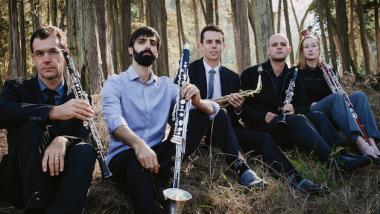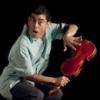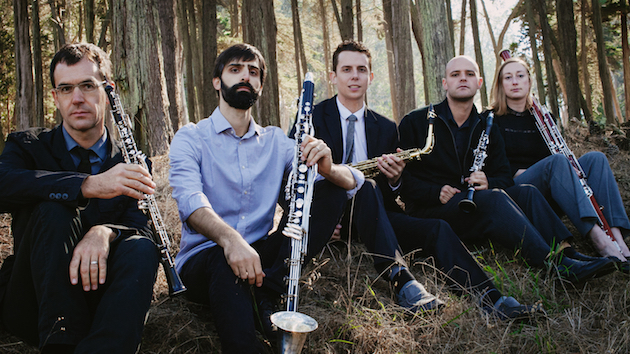
At the first Switchboard Festival for new music, co-founder Ryan Brown recalled, there wasn’t enough funding to buy food. So it was billed as a potluck: crockpots were paramount, and someone brought homemade kombucha that was too strong.
The core personnel have remained (and many performers have returned to the festival year after year) but financially, the festival has come a long way since 2008, and, at Z Space, was able to celebrate its 10th year in style — with cake.
Splinter Reeds, a quintet that, at only 4 years old, already feels like a Bay Area staple, played several interesting new works. Composer Eric Wubbels worked individually with each musician in the group to create Auditory Scene Analysis II, and it shows: the work draws an astonishing range of sounds and techniques out of each instrument. Buzzes, pops, and whistles populate this wild and colorful world. A world apart, murky romanticism characterizes the beginning of Bobu Rexazobe, by San Francisco-based composer Aaron Novik. Like its title, the piece takes off in surprising directions — a number of them. The individual ideas are compelling, but the effect is scattered.

The standout in the set was Letters To A Friend by Berkeley-based composer and cellist Theresa Wong. In this polished short work, individuals’ utterances converge in pitch centers, constellations that shift as soon as they’ve formed. Complex interlocking rhythms create momentum, and Splinter Reeds’ strong performance (with Switchboard co-founder Jeff Anderle on bass clarinet) conveyed Wong’s inspiration, a Portuguese poem she translated into Morse code.
Most exciting in the Kronos Quartet’s segment was Laurie Anderson’s Shutter Island, three brief and evocative movements. In “Crystal,” Anderson plays with opaque and translucent textures, to good effect: resonant harmonic tones coalesce in intriguingly cloudy harmonies. “Airy” initially sounds just that, but as the movement goes on, stuttering pizzicato lines create frenetic energy.
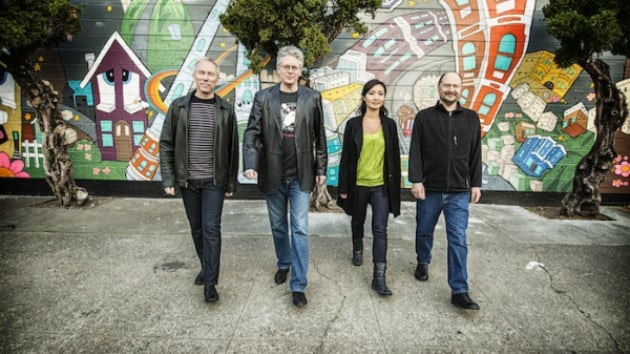
It’s always nice to be surprised, and in fact, the groups I knew the least about proved the most enjoyable to watch. Enormously creative stop-motion films elevated the somewhat forgettable rock music of Billygoat, the Portland-based band of David Klein and Nick Woolley. The two artists meticulously photograph, print, and collage subjects onto 3-D landscapes that they photograph frame-by-frame into a video and then project in synch with their live performances. Initial vignettes were simple and bold; this imagery, of snakes and skulls, could be in Pink Floyd’s The Wall. Then, the composites became increasingly ornate, immersing the audience in fantastical scenes of hoodoos and seas, caverns and galaxies. All music videos should be this good.
From both a compositional and performative standpoint, however, the a cappella sextet, composed and led by duo Ramon & Jessica (Dina Maccabee and Jesse Olsen Bay) stole the show. Roses Are Blue sets an unlikely text: Gertrude Stein’s 1939 children’s book, The World is Round, whose narrative is abstract yet linear. Indeed, it’s a family-friendly production: Stein’s words don’t always evoke strong images, but body percussion, animal sounds, and theatrical storytelling create a work that’s plenty engaging for kids. And Roses Are Blue is as good for the adults, who might appreciate the impressive confluence of styles (folksiness dissolves in beatboxing; one moment seems to nod to Renaissance motets). Ramon & Jessica create layers upon layers — mouthfuls of patter song over winning barbershop harmonies — and each movement is as inventive as the last.
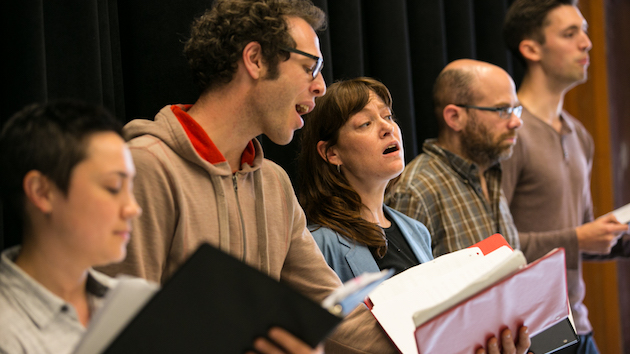
Delightfully, the childishness of the text (I am Rose my eyes are blue / I am Rose and who are you?) is exploited in the best way, and, thanks to the performers, never comes off as precious. Among the sextet, Lorin Benedict stood out for his theatrical magnetism and resonant bass notes.

